Funded by the State Justice Institute, the National Center for State Courts, in partnership with Rulo Strategies LLC, launched the Rural Justice Collaborative (RJC) to showcase the strengths of rural communities and highlight the cross-sector collaboration that is a hallmark of rural justice systems. These strengths include strong professional networks, deep ties to the communities they serve, resiliency, and ingenuity. The Rural Justice Collaborative is guided by an advisory council of rural practitioners representing the judiciary, public safety, behavioral health, public health, child welfare, victim services and other stakeholder-focused justice systems. The advisory council guides the initiative and has focused initial efforts on advancing innovation, promoting collaboration, and raising awareness of rural justice system needs.
Author: Lauren Curtis
FY 2025 2nd Quarter Board Meeting
The SJI Board of Directors will be meeting on Monday, April 7, 2025, at 1:00 PM ET. The purpose of this meeting is to consider grant applications for the 2nd quarter of FY 2025, and other business.
ADDRESS: Indiana Supreme Court, 200 W Washington St. Indianapolis, IN.
Trauma-Informed Practice Strategy Lab for Criminal Courts (TIPS Lab)
The Center for Justice Innovation, with funding from the State Justice Institute, is leading the development of the Trauma-Informed Practice Strategy Lab for Criminal Courts (TIPS Lab). The TIPS Lab aims to bridge the gap between training and implementation of trauma-informed practices in criminal courts. The TIPS Lab has developed a comprehensive Blueprint to address the urgent need for trauma-informed practices within the criminal court system. See attached for an Executive Summary of the forthcoming Blueprint.
The Center is currently offering no-cost, actionable training and technical assistance to select criminal courts to implement trauma-informed practices identified in the TIPS Lab Blueprint. Center staff will guide criminal court administrators, judges, and other partners as they prioritize, plan, and implement trauma-informed practices. Please complete this brief application to be considered for selection as an incubator site and receiving no-cost training and technical assistance: https://form.jotform.com/250224144518045
For more information, contact Alejandra Garcia at garciaa@innovatingjustice.org.
Civil Protection Orders: A Guide for Improving Practice
The National Council of Juvenile and Family Court Judges has just released a newly updated section of the Civil Protection Orders: A Guide for Improving Practice! This section of the publication focuses on the intersections of civil protection orders with firearms, military protective orders, and technology.
For more information and to access the publication, click here.
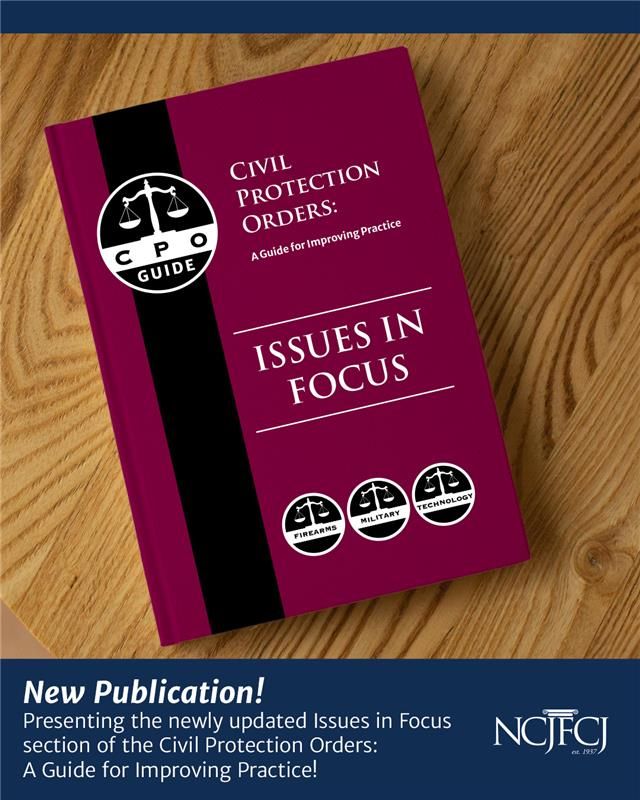
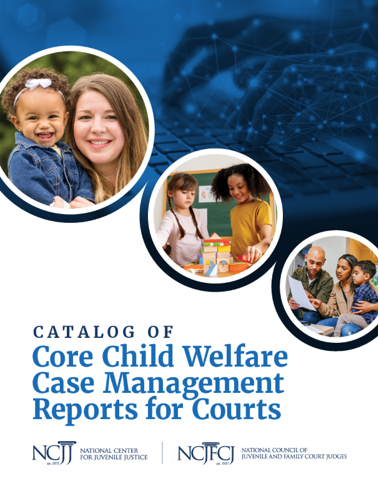
Enhancing State Court Efforts to Address Child Abuse and Neglect
In 2016, the National Council of Juvenile and Family Court Judges (NCJFCJ) developed the Enhanced Resource Guidelines (ERGs) to outline best practices for handling child abuse and neglect cases. To support implementation, NCJFCJ launched a project to train select jurisdictions in ERG-based practices.
The ERGs emphasize keeping families together, ensuring access to justice, cultural responsiveness, appropriate family time, and child safety. Research has shown that ERG implementation improves case outcomes, including faster permanency, better parental understanding in court, and increased family engagement.
Researchers from the National Center for Juvenile Justice (NCJJ), NCJFCJ’s research arm, analyzed data from three urban courts trained in ERG implementation. Their pre/post analysis found that ERG training positively impacts case processing and outcomes. Post-implementation, adoption rates increased, and hearings were less likely to be continued, reducing delays. Findings are under review for publication and will be presented this April at the 24th National Conference on Child Abuse and Neglect in Rockville, Maryland.
Additionally, NCJJ has published a catalog of dependency case management reports to help courts track key data for assessing and improving permanency outcomes. This resource provides guidance on essential data collection, report creation, and information-sharing strategies to enhance child welfare case processing.
The Rural Justice Collaborative Digest for February 2025
Funded by the State Justice Institute, the National Center for State Courts, in partnership with Rulo Strategies LLC, launched the Rural Justice Collaborative (RJC) to showcase the strengths of rural communities and highlight the cross-sector collaboration that is a hallmark of rural justice systems. These strengths include strong professional networks, deep ties to the communities they serve, resiliency, and ingenuity. The Rural Justice Collaborative is guided by an advisory council of rural practitioners representing the judiciary, public safety, behavioral health, public health, child welfare, victim services and other stakeholder-focused justice systems. The advisory council guides the initiative and has focused initial efforts on advancing innovation, promoting collaboration, and raising awareness of rural justice system needs.
Courting AI: Understanding Artificial Intelligence in Courts Guide
The National Association for Court Management (NACM) has released an updated Courting AI: Understanding Artificial Intelligence in Courts Guide.
The National Association for Court Management presents the first revision of their AI Guide adding additional use cases in the courts and the broader legal profession. This guide continues to be a reference for courts and court professionals pursuing the responsible use of AI.
The AI Guide, Courting AI: Understanding Artificial Intelligence in Courts, V2 (2025) is available through the NACM Store – National Association for Court Management.
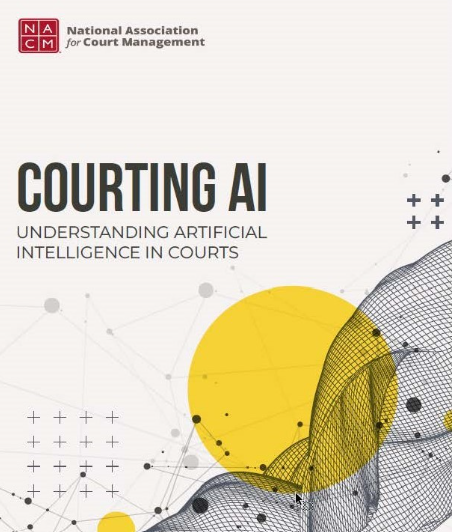
Upcoming Webinar! NACM Court Security Webinar
Wednesday, February 26th, 2025, at 3:00PM EST
The revised National Association for Court Management (NACM) Court Security Guide incorporates the latest best practices and technological advancements to help mitigate risks and ensure the protection of judiciary personnel, visitors and facilities. The guide was developed in collaboration with security experts and court managers and provides practical strategies for implementing effective security protocols. This webinar seeks to delve deeper into the discussion on court security and provide additional resources for you to implement in your court.
Join in on February 26th, 2025, at 3:00PM EST to learn how the NACM Court Security Guide can help courts just like yours implement a new court security initiative or improve on your current security protocols. The court security guide can be purchased from the NACM store for non-members and is offered for free to members as a member perk.
Register here: Webinar Registration – Zoom
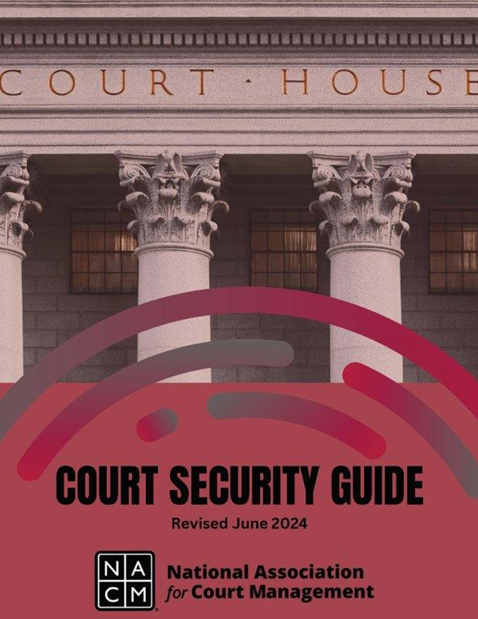
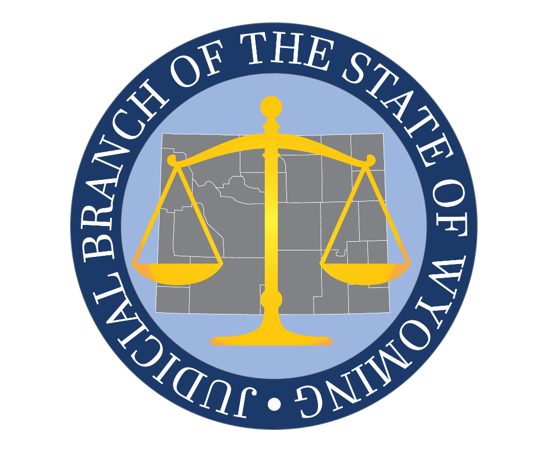
Wyoming Judicial Branch Mental Health Diversion Project
Behavioral health diversion is built on a guiding hypothesis: Diverting non-violent individuals with serious mental illness away from the criminal justice system and into community-based treatment and support services will transform lives, reduce recidivism, generate cost savings, and ease the burden on jails, courts, and state hospitals. This hypothesis has been proven in well-resourced urban centers like Miami. The Wyoming Judicial Branch is now testing whether it holds true in a rural, under-resourced jurisdiction like Wyoming.
To test this hypothesis, the Wyoming Judicial Branch launched the state’s first diversion pilot in Campbell County on January 1, 2024. The program operates as follows: eligible individuals (those who commit non-violent misdemeanors, have a diagnosis of serious mental illness, are assessed as moderate to very high criminogenic risk, and do not pose a public safety threat) are offered the option of diversion. Participants who choose diversion and successfully complete an individualized treatment plan have their charges dismissed. Those who decline or fail to complete the program return to the traditional criminal justice process.
With funding from the State Justice Institute, the Wyoming Judicial Branch partnered with the National Center for State Courts to provide training and technical assistance for the Campbell County pilot and up to three additional pilots across the state.
Early results are promising. The pilot program’s first graduate spent 623 days in jail before entering diversion and zero days in jail after entering the program. While it is too early for definitive conclusions, these results suggest behavioral health diversion works in rural settings.

The Judicial Innovation Fellowship Program
The Judicial Innovation Fellowship (JIF) is a fellowship for technology industry professionals to transform justice across state, local, territorial, and tribal courts. Partnering with courts to build critical data infrastructure, simplify processes, and improve usability of court services, this competitive fellowship is a unique opportunity to innovate a core democratic institution.
The Judicial Innovation Fellowship is incubated at the Georgetown Institute for Technology Law & Policy. This work is made possible by the State Justice Institute, the New Venture Fund, Schmidt Futures, the Ford Foundation, the Utah Bar Foundation, the Pew Charitable Trusts, and the Fritz Family Foundation.
The inaugural cohort took place from 2023-2024. This successful pilot is commemorated in the JIF Final Report and the Judicial Innovation Fellowship Webinar video, which was recorded in January 2025.
To read about how the program was built, please read the JIF Roadmap.

